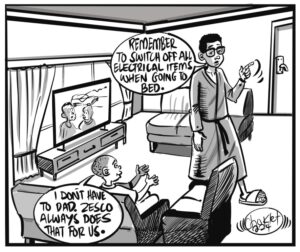The Jesuit Centre for Theological Reflection (JCTR) says the abuse of public funds by those in government and the huge debt burden of the country remain the key reasons for the delay in paying civil servants’ salaries.
In a statement released, Wednesday, JCTR Social and Economic Development Officer Paul Chileshe expressed dismay at government’s delayed payment to settle UNZA lecturers and other civil servants’ February salaries.
“JCTR notes that among the causes of the delay in salaries is the huge debt burden, which the country is currently owing and servicing. Beyond debt, the unsympathetic abuse of public funds by those in power has been devastating and has contributed to reduced government coffers resulting in delayed salaries. For instance, the 2017 Auditor General’s Report showed that wasteful expenditure increased from K3,586,879 in 2016 to K7,586,895 in 2017; misappropriation of funds increased from K3,618,127 in 2016 to K5,036,051 in 2017 and irregular payments increased from K1,591,348 in 2016 to K21,791,360 in 2017,” Chileshe stated.
“It is a pity that the monthly salaries for some civil servants have not been paid and the government has not given a fixed date when these salaries will be paid. Unfortunately, this is not the first time salaries are being delayed for an institution like the University of Zambia and the local councils. This is very embarrassing because not only is the government reducing the dignity of workers, but is also infringing on their rights and promoting a poor work culture among civil servants.”
He argued that government was actually breaking the law by not paying civil servants their February salaries.
“According to Section 48 (2) of the Employment Act, wages of an employee should be paid at regular intervals not being later than the fifth day following the date upon which the wages fall due. Workers’ rights explicitly point out that everyone who works has the right to just and favourable remuneration ensuring for himself and his family an existence worthy of human dignity. Delay of salaries by over five days is a breach of the law by the government and should be highly condemned by all well-meaning citizens,” he stated.
“The country has already started experiencing the effects of delayed salaries; lecturers at the University of Zambia have stopped lecturing and will only resume when salaries are paid. The absence of lecturers affects our education system and compromises the quality of graduates from universities who should contribute to the development of our country. The JCTR further notes that the Lusaka cost of living for a family of five has remained high at K5,331 (per month). The high cost of living has proved to be a challenge for most households, especially the most vulnerable, as they are failing to afford basic needs of life. Delaying salaries will only worsen poverty levels in our country and promote bad vices!”
JCTR has since urged government to fight the misuse of public funds and balance repayment of debt and provision of the social services in the country.
“The JCTR urges the government to respect civil servants by paying them on time and abiding by the law that stipulated in the Employment Act. The government should lead by example by paying workers on time and upholding the rights of all workers. JCTR also urges the government to balance debt repayment and provision of social services for Zambians. Lastly, we urge the government to use public funds prudently and ensure that they put up stringent measures that will prevent the high misuse of public funds. In this period of economic distress, fiscal discipline should be the number one priority for the government,” appealed Chileshe.












